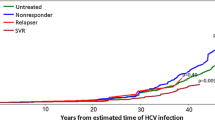Abstract
Tremendous progress has been made in the treatment of chronic hepatitis C. Over 50% of patients treated with pegylated interferon and ribavirin experience permanent eradication of the hepatitis C virus. The indications for therapy have been expanded based on evolving data concerning the safety and efficacy of these agents. Although awareness of which patients in whom to initiate therapy is important, a thorough understanding of features of the antiviral response is also necessary so that treatment can be discontinued when the chances of sustained response are nil. Recent studies have defined virologic milestones that are useful for managing patients during antiviral therapy. Pretreatment genotype and response to therapy measured at weeks 12 and 24 of treatment have been identified as key determinants in decisions about continuing treatment. Progress in defining early treatment stopping points has reduced adverse events in patients who are unlikely to respond to therapy.
Similar content being viewed by others
References and Recommended Reading
National Institutes of Health Consensus Development Conference Statement: Management of hepatitis C 2002 (June 10-12, 2002). Gastroenterology 2002, 123:2082-2099.
Fried MW, Shiffman ML, Reddy KR, et al.: Peginterferon alfa-2a plus ribavirin in chronic hepatitis C virus infection. N Engl J Med 2002, 347:975–982. This study defines early virologic response in relationship to sustained response.
Manns MP, McHutchison JG, Gordon SC, et al.: Peginterferon alfa-2b plus ribavirin compared with interferon alfa-2b plus ribavirin for initial treatment of chronic hepatitis C: a randomised trial. Lancet 2001, 358:958–965.
Hadziyannis S, Cheinquer H, Morgan T, et al.: Peginterferon alfa-2a (PEGASYS) in combination with ribavirin: efficacy and safety results from a phase III randomized, double-blind, multicenter trial examining effect of duration of treatment and ribavirin dose [abstract]. J Hepatol 2002, 36(Suppl_1):3.
Davis GL, Wong JB, McHutchison JG, et al.: Early virologic response to treatment with peginterferon alfa-2b plus ribavirin in patients with chronic hepatitis C. Hepatology 2003, 38:645–652. This retrospective analysis provides important data from a large multicenter trial on the value of early HCV RNA determinations during the course of treatment. Reduction in viral levels at weeks 4 and 12 of treatment may identify those who will develop a sustained response.
Davis GL: Monitoring of viral levels during therapy of hepatitis C. Hepatology 2002, 36:S145-S151. A concise review of two large clinical trials of pegylated interferon and ribavirin was presented and demonstrated the value of early virologic response as a predictor of sustained viral response.
Hoofnagle JH: Course and outcome of hepatitis C. Hepatology 2002, 36:S21-S29.
McHutchison JG, Gordon SC, Schiff ER, et al.: Interferon alfa-2b alone or in combination with ribavirin as initial treatment for chronic hepatitis C. Hepatitis Interventional Therapy Group. N Engl J Med 1998, 339:1485–1492.
Marcellin P, Brillanti S, Cheinquer H, et al.: Peginterferon alfa-2A (40 kD) (PEGASYS) plus ribavirin (Copegus) is an efficacious and safe treatment for chronic hepatitis C (CHC) in patients with compensated cirrhosis [abstract 4510.00]. Presented at EASL annual meeting. July 3–6, 2003, Geneva,Switzerland.
Pawlotsky JM: Use and interpretation of virological tests for hepatitis C. Hepatology 2002, 36:S65-S73.
Layden-Almer JE, Layden TJ: Viral kinetics in hepatitis C virus: special patient populations. Semin Liver Dis 2003, 23(Suppl 1):29–33.
Layden-Almer JE, Ribeiro RM, Wiley T, et al.: Viral dynamics and response differences in HCV-infected African American and white patients treated with IFN and ribavirin. Hepatology 2003, 37:1343–1350.
Lutchman G, Hoofnagle JH: Viral kinetics in hepatitis C. Hepatology 2003, 37:1257–1259.
Pawlotsky JM: Diagnostic testing in hepatitis C virus infection: viral kinetics and genomics. Semin Liver Dis 2003, 23(Suppl_1):3–11.
Zeuzem S, Herrmann E, Lee JH, et al.: Viral kinetics in patients with chronic hepatitis C treated with standard or peginterferon alpha2a. Gastroenterology 2001, 120:1438–1447.
Ferenci P, Shiffman ML, Fried MW, et al.:Early prediction of response to 40KDA peginterferon alfa-2a (PEGASYS) plus ribavirin in patients with chronic hepatitis C [abstract]. Hepatology 2001, 34:351A.
McHutchison JG, Manns M, Patel K, et al.: Adherence to combination therapy enhances sustained response in genotype-1-infected patients with chronic hepatitis C. Gastroenterology 2002, 123:1061–1069.
Pawlotsky JM, Bouvier-Alias M, Hezode C, et al.: Standardization of hepatitis C virus RNA quantification. Hepatology 2000, 32:654–659.
Berg T, Sarrazin C, Herrmann E, et al.: Prediction of treatment outcome in patients with chronic hepatitis C: significance of baseline parameters and viral dynamics during therapy. Hepatology 2003, 37:600–609.
Fried MW: Side effects of therapy for hepatitis C and their management. Hepatology 2002, 36:S237-S244.
Afdhal NH, Dieterich DT, Pockros, et al.: Epoetin alfa treatment of anemic HCV-infected patients allows for maintenance of ribavirin dose, increases hemoglobin levels, and improves quality of life vs placebo: a randomized, doubleblind multicenter study [abstract]. Gastroenterology 2003, 124:505.
Author information
Authors and Affiliations
Rights and permissions
About this article
Cite this article
Russo, M.W., Fried, M.W. Guidelines for stopping therapy in chronic hepatitis C. Curr Gastroenterol Rep 6, 17–21 (2004). https://doi.org/10.1007/s11894-004-0021-6
Issue Date:
DOI: https://doi.org/10.1007/s11894-004-0021-6




